Write Us
We are just a call away
[ LET’S TALK AI ]
X
Discover AI-
Powered Solutions
Get ready to explore cutting-edge AI technologies that can transform your workflow!

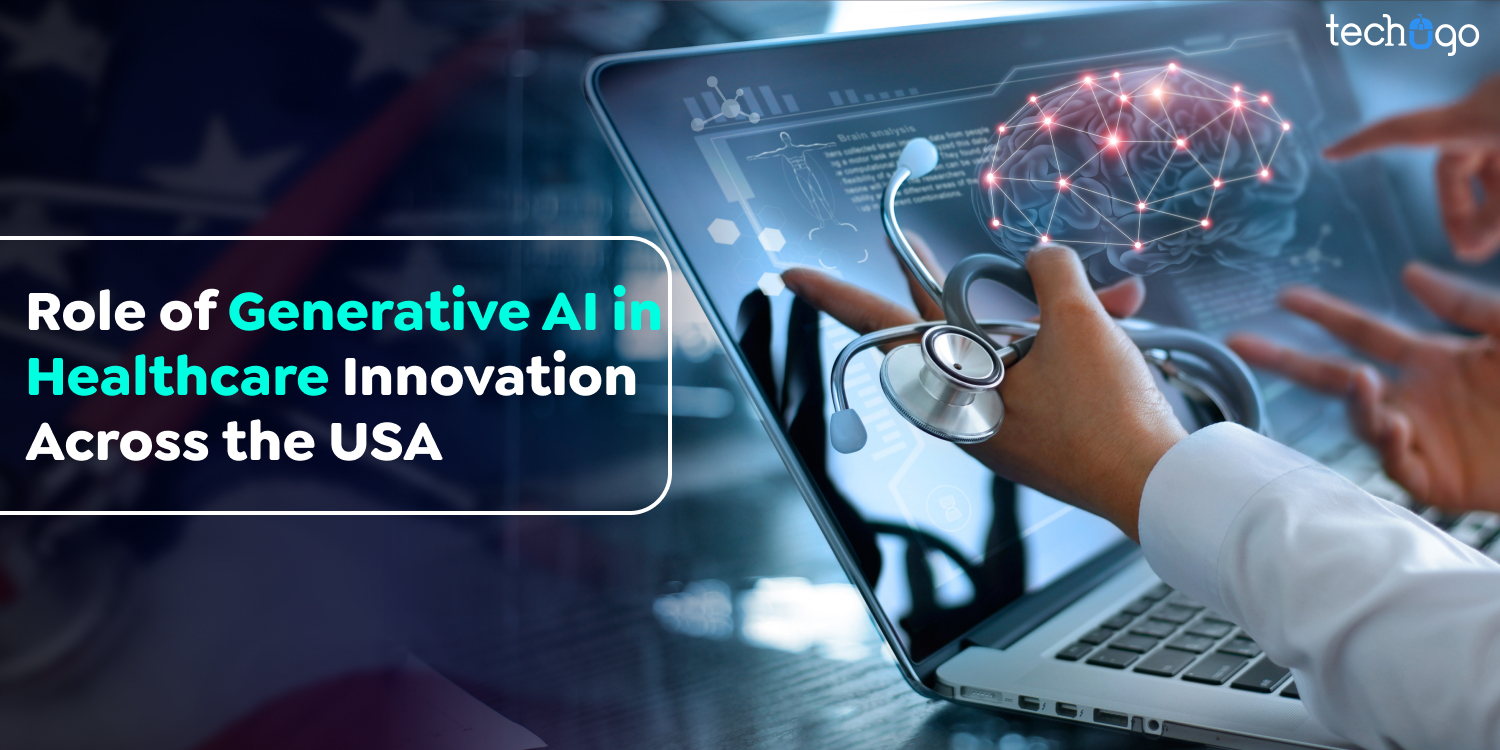
In recent years, rapid generative artificial intelligence (Gen AI) development has been demonstrated to have transformative capabilities across diverse industries, including medical technology and healthcare (MedTech). From diagnostic imaging to drug development, the role of generative AI in healthcare innovation across the USA is already beginning to provide fresh insights, enhance decision-making, and streamline complex tasks. This technology is set to change the face of medical innovation.
However, as AI-driven technologies become more prevalent, it is becoming clear that the need for strict and reliable regulation is becoming more critical. The global healthcare market for generative AI is predicted to experience significant growth at a rate of 34.9% from 2023 through 2032, with generative AI in healthcare expected to reach $30.4 billion by 2032.
The impact of generative AI extends well beyond the healthcare industry. Healthcare payers benefit from AI-driven healthcare management, combining clinical notes and referral information into personalized treatment programs. This technology also revolutionizes claims management, enabling faster and more precise processes. Within the MedTech industry, generative AI is sparking innovative thinking in product design and ensuring product quality through rapid flaw detection.
Are you interested in learning more? This guide will explore the significance of generative AI in the healthcare field.
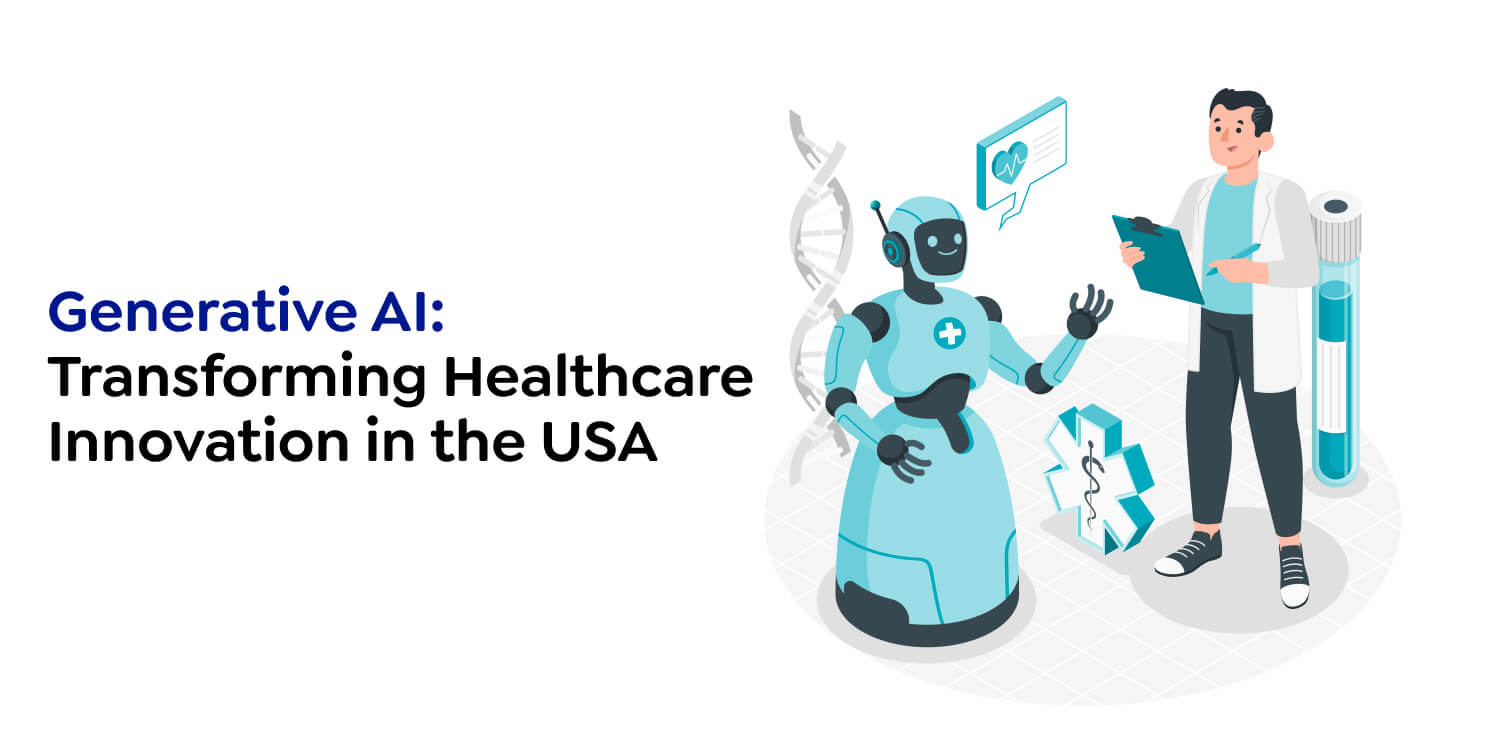
Generative AI is a kind of artificial intelligence trained to detect data patterns and produce new content. Healthcare has vast potential, containing enormous amounts of unstructured data spread across various sources. However, there are limited options to turn that data into valuable assets. GenAI-based healthcare applications can help bridge this gap.
When used strategically, GenAI applications can enhance the quality of various aspects of healthcare, from the continuity of care to contracting, clinical operations, and even general corporate tasks, such as back-office functions like accounts payable and purchasing.
The USA healthcare gen AI market was valued at $518.4 million in 2023 and is projected to reach at a CAGR of 36.4% from 2024 through 2030. This growth is primarily driven by increased awareness of remote patient monitoring and the increasing adoption of AI technology. Generative AI is revolutionizing the medical industry by providing healthcare professionals with valuable insights that enable them to deliver the highest quality treatment to their patients.
In clinical care, GenAI holds significant potential for creating discharge summaries, presenting relevant, expert-authored clinical information, translating instructions into various languages, generating laboratory summaries based on physician rounds, and synthesizing shift handoff notes. Additionally, GenAI can be utilized to enhance Electronic Health Record (EHR) functionality by pre-populating visit summaries and suggesting modifications to documentation.
GenAI is more than a technology marvel; it is an effective solution to increase operational efficiency, improve patients’ experiences, and boost revenues, resulting in an efficient and financially viable healthcare system.
Gen AI is improving healthcare processes, such as the management of resources and the flow of patients. For example, AI algorithms can predict patient flow, helping hospitals plan staffing levels and develop strategies to reduce wait times. Additionally, GenAI leverages pattern recognition in healthcare delivery to identify issues and suggest solutions, ultimately improving patient outcomes while reducing operational costs.
GenAI is a valuable tool in medical research. One of its main features is to generate synthetic data that closely resembles real patient data. This is particularly useful in pediatric studies or for researching rare diseases, where data may be sparse or difficult to obtain. Synthetic data can be used to simulate clinical trials, test hypotheses, and model diseases without the ethical and security risks associated with using real patient data. This accelerates research, reduces costs, and fosters the development of innovative treatments.
Generative AI integration services enhance the personalization of healthcare by analyzing individual health data to tailor treatments. A personalized approach to medicine based on understanding how each individual’s environment, genetics, and lifestyle influences affect a person’s health can significantly improve treatment results.
AI models can quickly sift through vast amounts of data, including genetic information, to recommend the best treatment options for each patient. This approach improves treatment effectiveness while reducing the risk of adverse reactions, leading to better patient outcomes and higher satisfaction.
In the field of healthcare, lack of data and quality is a major issue impacting research and development. Gen AI achieves this by creating high-quality synthetic datasets that can enhance the accuracy of data and solve issues of scarcity and privacy in actual information. This opens up the possibility of research and the ability of AI algorithms to create higher-quality and accurate health solutions.
Imagine a future where patients can use AI-powered chatbots developed by Generative AI development company to book appointments, resolve billing inquiries, and navigate insurance claims. GenAI could significantly ease the burden on healthcare workers by handling various customer service tasks.
Additionally, GenAI functions as a virtual assistant that can generate reports, presentations, and updates on medical knowledge. By learning from extensive medical databases, GenAI enables healthcare professionals to access and evaluate data more efficiently, ultimately optimizing operational costs and improving decision-making.
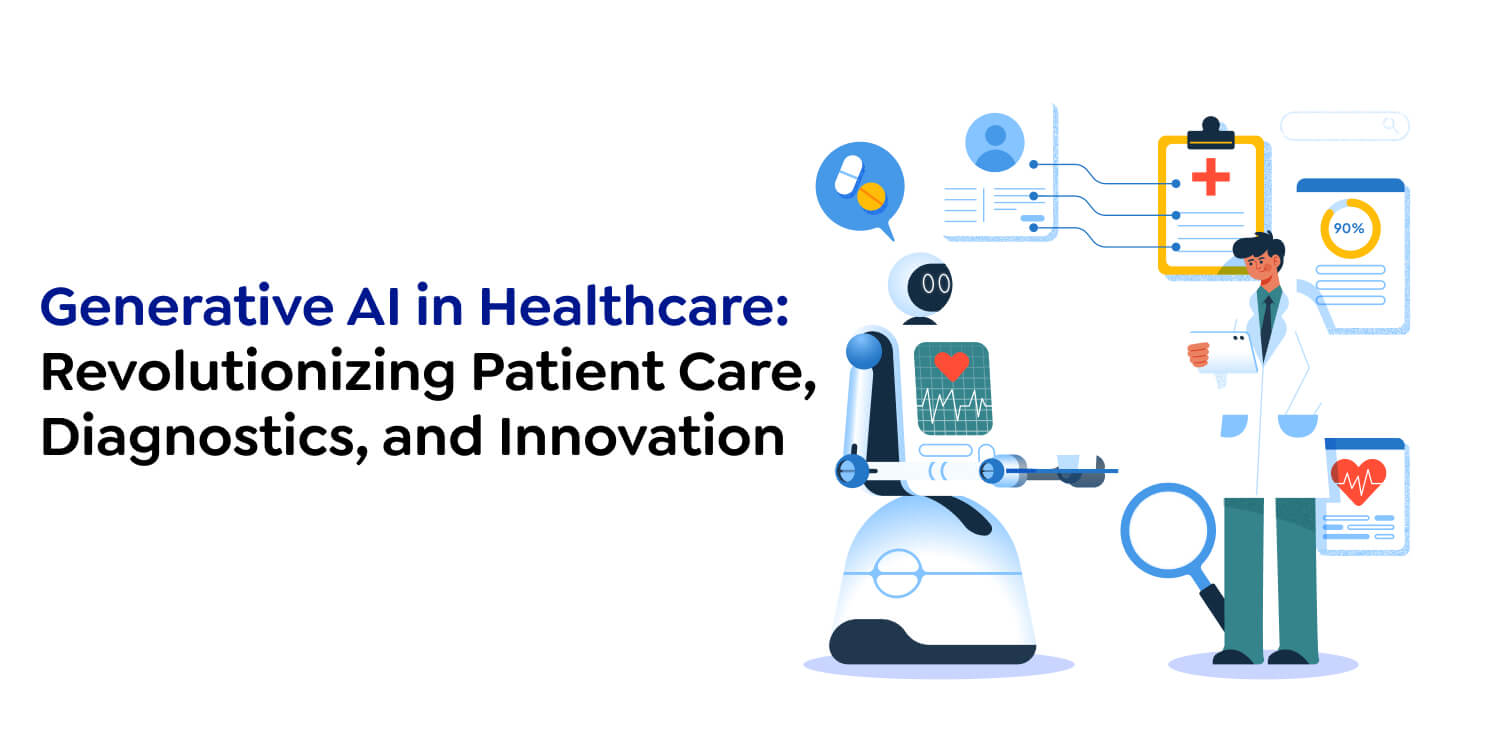
The role of Generative AI in healthcare innovation across the USA is unlocking new possibilities to improve patient outcomes, enhance efficiency, reduce costs, and foster innovation throughout the healthcare system. Generative AI offers transformative benefits at every stage, from drug discovery to treatment strategies, showcasing its potential in revolutionizing medicine.
Generative AI models developed by adaptive AI development company are already proving to be invaluable in diagnosing and treating patients, often enabling quicker treatments that could potentially save lives. Trained AI tools can quickly analyze lab results, patient records, and medical imaging scans to detect subtle patterns that may elude the human eye. For instance, AI can spot tiny anomalies in MRIs and CT scans that may indicate life-threatening diseases at their earliest stages.
By analyzing voluminous historical data, AI can also predict how a particular illness might manifest in an individual patient, allowing healthcare professionals to tailor treatment plans more effectively. This leads to faster diagnoses, fewer unnecessary tests or procedures, and more personalized care for patients.
Research has shown that AI-assisted diagnostics can improve patient outcomes by up to 40%, while also reducing treatment costs by as much as 50%. This personalized approach leads to fewer errors, more precise treatments, and ultimately, better health outcomes for patients.
The medical chatbots powered by Gen AI are revolutionizing engagement and support. Virtual assistants are available for help 24/7 to offer communication solutions that provide advice, answer questions, and help patients navigate their medical journey. Chatbots use natural language processing to identify symptoms, recommend steps to take, and notify healthcare professionals when necessary. This increases access to healthcare and maximizes resources for healthcare.
Concerning healthcare for patients, Generative AI technology can customize how healthcare is delivered by customizing treatment plans and monitoring them to meet patients’ needs. These AI tools analyze large amounts of information, such as lifestyle, genomics, and health-related information, that is ongoing in the design of individualized care programs. The role of generative AI in healthcare innovation across the USA will also increase the standard of the patient’s service. This improves patients’ treatment compliance and decreases the risk of medical errors.
Additionally, virtual assistants and robotic therapists improve access and ease of use for healthcare professionals and patients. Research shows that people are much more inclined to talk with therapists using robotics, particularly for sensitive concerns like substance abuse or mental health problems.
Making and implementing new medications can be crucial to pushing the boundaries of healthcare possibilities. Generative AI can accomplish this faster and more efficiently than before. AI models designed by mobile app development company in USA will be able to rapidly analyze current compounds. They will explore the possible combinations, and create new compounds that are likely to increase the effectiveness of the therapy or create entirely new treatments.
This streamlines the process for clinical trials, reducing both the time and cost involved in drug development. Additionally, Generative AI can study databases on chemical structures and the body’s constitution to determine how a specific medication will affect a patient with a particular range of health conditions. This aids in understanding the effectiveness of the medication and alerts one to the possibility of adverse side effects.
Additionally, Generative AI can simulate what happens in the trial and help your research team develop better trials and select the most suitable patients. This is essential in bringing crucial drugs to the market faster.
Generative AI scans and interprets medical photos significantly faster than humans, helping healthcare providers reach the correct diagnosis quickly. This is a blessing in an emergency situation where just one second could be the difference between life and death for the patient. The latest AI technology is skilled at detecting anomalies such as fractures or tumors, spotting symptoms that human eyes might miss, and ensuring that the issue is dealt with in the early stages before problems develop.
This reduces the radiologist’s stress since they don’t need to scrutinize each MRI. They can program the AI algorithm to flag only the most important cases, which allows them to concentrate their efforts where they’re most important. This means you’ll have a happier and more efficient team that can provide faster and more accurate diagnoses while optimizing the diagnostic process.
One of the best medical applications of Generative AI is to streamline administrative duties that occupy the healthcare staff’s bandwidth. For example, AI models powered by Natural Language Processing (NLP) can quickly translate doctor-patient conversations and create medical documents, increasing the speed of documentation and enabling quicker billing.
Generative AI tools can also assist with scheduling appointments and deploying staff. By analyzing real-time data on patient demand and staff availability, AI can ensure that patients receive timely care without overwhelming the healthcare team. This helps optimize scheduling, improving patient flow and staff efficiency.
Generative AI excels in managing insurance claims. It can swiftly check every claim to ensure compliance, manage prior authorizations, and accelerate approval. This speeds up the timeframe for payment, improves patient satisfaction, and makes it simpler for the providers you work with.
Smartphones and wearables are sporting fitness and health options by default, Generative AI can monitor patients remotely on an all-new level. Through studying the data of the heart rate, oxygen levels as well as other indicators and patterns, Generative AI can spot signs that may indicate decline in health and provide messages on how the user may alter their habits (such for example, by exercising exercises) in order to prevent future issues.
Patients can take control of their own health and avoid expenses associated with treating severe diseases. Furthermore, AI can share instant messages to health professionals when changes in the vitals of a patient occur and allow them to come into action quickly.
Technology could examine a patient’s heart monitor in order to identify warning signs of a problem prior to the patient experiencing something. Healthcare professionals can intervene and plan an appointment with the patient. This will stop the condition before it can result in hospitalization. This helps improve the patient’s experience and decreases the burden for your staff, allowing the team to focus only on the most pressing cases.
The area has a lot of potential for AI deployment driven by two primary reasons. The first is that while patient adhering to the post-treatment recommendations is vital, doctors have little ways to monitor the compliance of patients. Insufficient compliance can reduce the effectiveness of treatment and negatively impact the health of patients and cause costs for the health care providers.
The second is that the development of wearable devices, smart devices as well as smartphones by healthcare app development company with a variety of sensors gives us a unique possibility to observe patient behaviour in non-clinical settings. AI is able to use the data to give real-time monitors and individualized recommendations and treatments. Given the access to this vast dataset, AI can also enable doctors to address the health issues of patients by advising healthcare professionals when urgent medical attention is required.
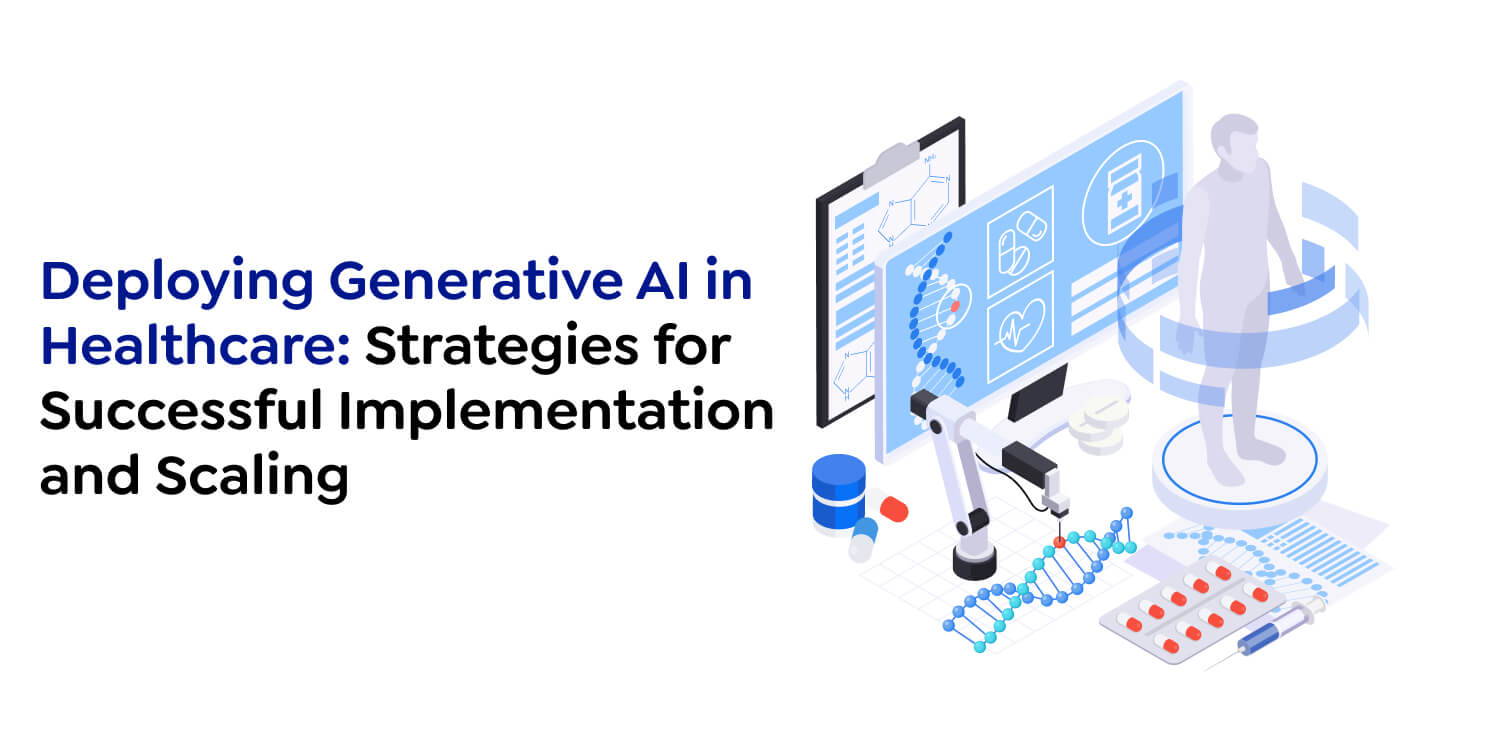
The implementation of Generative AI done with the help of Generative AI consulting company to improve healthcare involves a strategic plan of action, investments in technology, and a focus on successful integration and scale.
Companies must establish the development of a strategic plan that sets out the goals of incorporating Gen-AI into their business. It is essential to identify particular healthcare issues to tackle issues like improving the accuracy of diagnosis, enhancing the patient’s care, and streamlining the discovery of drugs. Making investments in a suitable technology infrastructure is vital. It includes computing equipment capable of processing massive amounts of data and having access to AI models and software specially designed for healthcare-related applications.
For Gen AI to effectively enhance health services, it must seamlessly integrate into existing healthcare systems and workflows. It requires incorporating technology into IT systems and ensuring healthcare professionals are adequately trained to use these advanced instruments efficiently. Integration success also requires aligning Gen-AI tools with the clinical objectives and standards of care for patients to ensure they can improve care and not disrupt delivery.
The power of Gen-AI in healthcare lies in its ability to analyze and extract insights from large datasets. Businesses need to establish methods for collecting, storing, and processing vast amounts of information from sources such as digital health records, imaging data, genomic information, and more. Ensuring data accuracy and accessibility is key to enabling Gen-AI models to learn efficiently and deliver accurate, actionable outcomes.
Scaling Gen-AI solutions involves expanding their application across various sectors, healthcare settings, and patient groups. This requires a flexible, adaptable technology infrastructure and a deployment approach that can adjust to different needs and operational scales. Successful scaling also involves continuously monitoring performance, making necessary adjustments, and responding to feedback from healthcare professionals and patients.
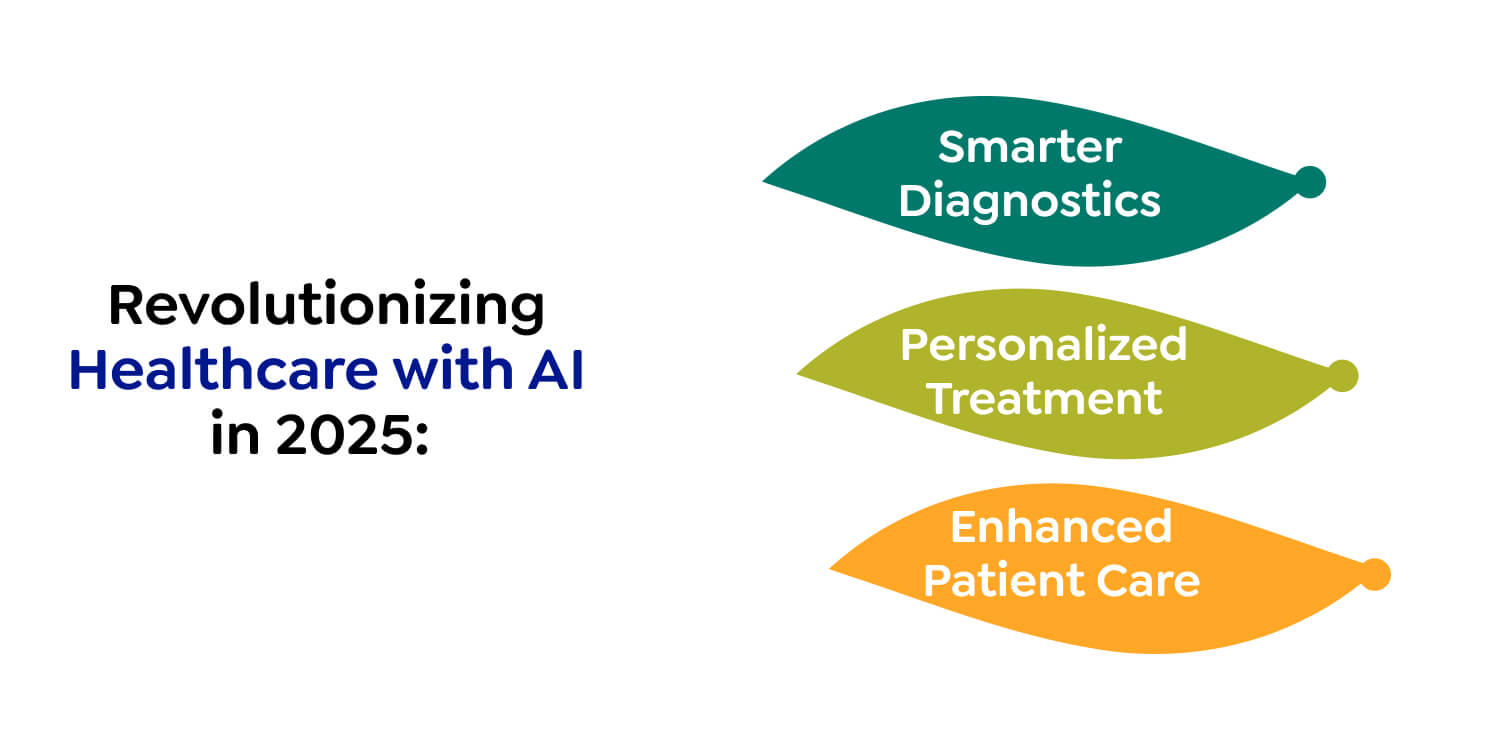
Healthcare professionals are keen on AI instruments that offer clear benefits, such as improved clinician experience, lower cost of operations, enhanced efficiency in administrative processes, or better patient care. Here are a few examples.
Numerous organizations are currently moving towards AI through ambient listening, a machine-learning-powered audio solution. Utilized initially by doctors and later expanded to nurses, the voice recognition technology analyzes and listens to conversations between the patient and provider in real-time. Then it extracts relevant details for clinical notes, meeting codes, and billing requirements. Clinicians can focus on the patient instead of working on multiple tasks to complete paperwork.
Companies have embraced ambient listening as the initial step towards AI because they’ve analyzed and discovered a clear ROI for this technology regarding effectiveness in clinical care and lessening burnout. Another reason is that the use of ambient listening isn’t as threatening as it was in the past. The technology now belongs to the low-hanging category of fruit in the health AI area, as does the summarization of charts.
Some healthcare companies are exploring retrieval-augmented generation (RAG), an AI framework that combines traditional vector databases with large language models (LLMs). This allows users to interact with AI-powered chatbots that access up-to-date, accurate information from within the organization. RAG helps improve chatbot responses to employee questions and addresses some challenges associated with generative AI tools.
Another area of interest is using synthetic data for AI testing and development. Since obtaining reliable data to validate models can be difficult, synthetic data helps ensure accuracy. Healthcare organizations are now scrutinizing models to ensure they perform as promised. While previously unsure of what to ask, healthcare professionals now have more resources to evaluate models effectively.
By integrating cameras, sensors, and microphones into patient rooms, healthcare facilities can collect valuable data analyzed by AI platforms to improve care. For example, cameras can detect when a patient has been repositioned in bed, notifying staff so they no longer need to perform the task manually. Other cameras can detect when a patient rises, alerting personnel to prevent falls.
As Internet of Medical Things (IoMT) sensors and cameras increase in patient rooms, opportunities will grow to combine machine vision and ambient sound AI to enhance patient care and clinical workflows.
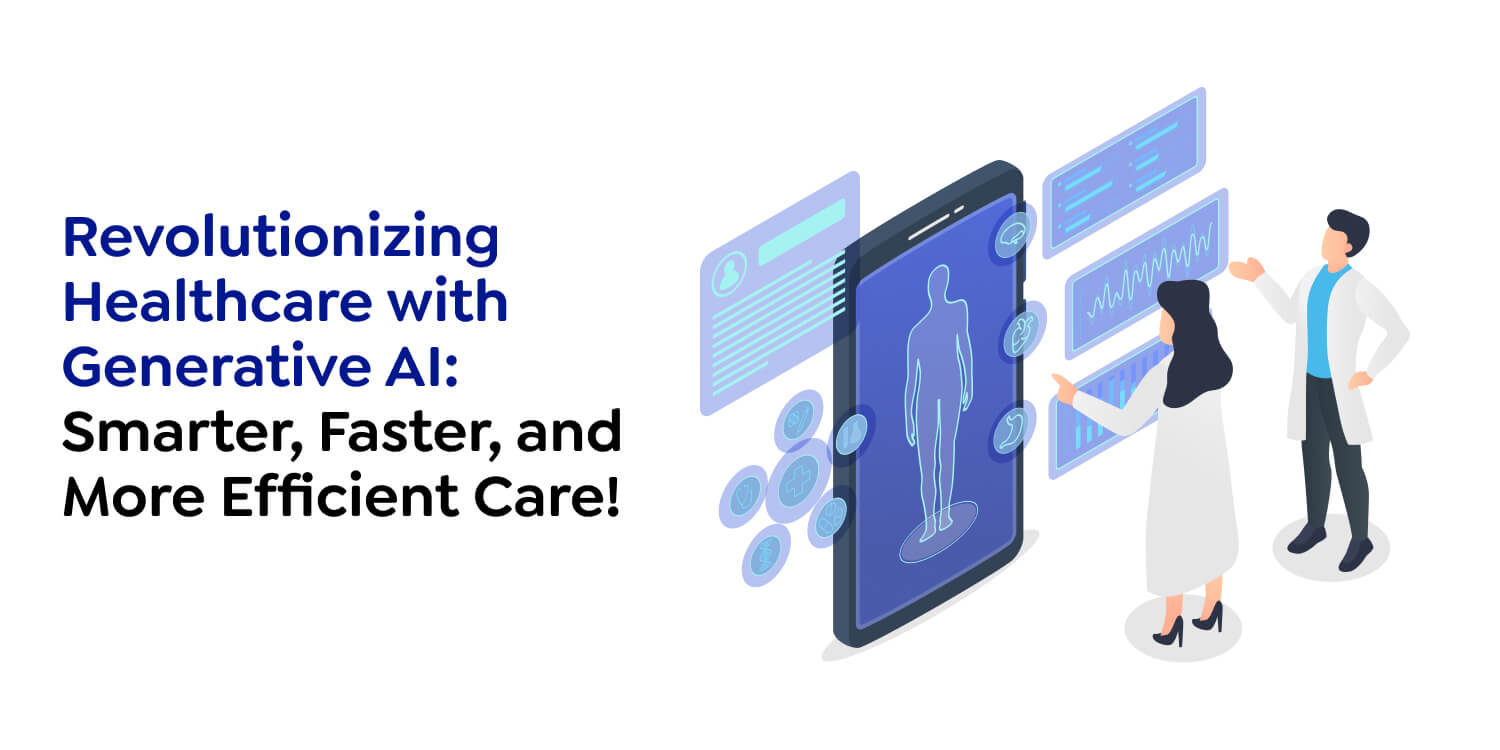
GenAI represents the future of healthcare, offering tremendous opportunities to enhance patient care, improve efficiency, reduce costs, and spark creativity. As the healthcare industry adopts GenAI technology and understands the role of generative AI in healthcare innovation across the USA it promises a brighter, more patient-focused future.
Generative AI is transforming the health sector by making diagnostics more accurate, speeding up treatment discovery, personalizing treatments, and advancing medical research. With the help of generative AI, doctors and healthcare professionals can make more accurate diagnoses, uncover innovative therapies, and deliver individualized care to patients.
However, it is essential to address the challenges and ethical concerns associated with the implementation of generative AI in healthcare. With continued research and development, generative AI is set to transform the healthcare sector and improve patient outcomes in the near future.
Partner with Techugo to revolutionize healthcare with Generative AI. Get in touch today!
Write Us
sales@techugo.comOr fill this form